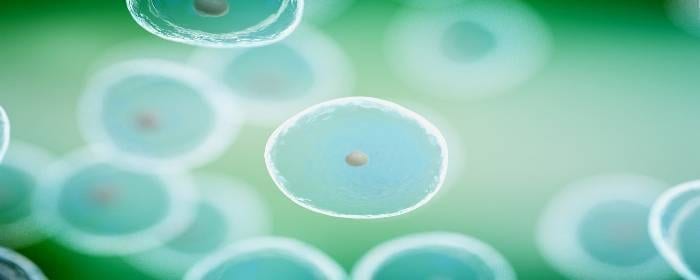
by admin | Oct 11, 2019 | Mesenchymal Stem Cells, Exosomes, Osteoarthritis
The field of Regenerative Medicine has shown great promise for helping those with a variety of chronic diseases, including arthritis. Indeed, data on the potential value of using stem cells to address issues relating to arthritis have been growing. While specific stem cells like mesenchymal stem cells have demonstrated therapeutic effects in models of arthritis and other inflammatory diseases, the specific ways in which these cells confer their benefits are not yet well understood. Given that these stem cells contain different types of elements, it is important that research establishes which of these elements is critical to the therapeutic properties of stem cells.
A recent study, published in Theranostics, looked specifically at the different effects that small exosomes and larger microparticles from within mesenchymal stem cells have on the inflammatory processes that occur in arthritis. To conduct their experiment, scientists isolated the exosomes and microparticles from mesenchymal stem cells using an ultracentrifugation technique and then exposed the exosomes and the microparticles to cells of the immune system – specifically, T and B lymphocytes, which are implicated in arthritis.
What the researchers found was that, in their models of arthritis, both the exosomes and the microparticles suppressed the T lymphocyte proliferation that is indicative of inflammation. However, unlike microparticles and even parental mesenchymal stem cells, the exosomes were also able to induce other anti-inflammatory effects. The result of exosome activity was, therefore, more efficient blunting of inflammation.
These results point to the potential of not just stem cells, but specifically the exosomes of these cells, in therapeutically addressing inflammatory arthritis. While more research is needed to understand how these exosomes could actually impact arthritis patients, these data provide hope that stem cells and even just elements of stem cells will help these patients by improving their ability to combat problematic inflammation.
Reference: Cosenza, S. et al. (2018). Mesenchymal stem cells-derived exosomes are more immunosuppressive than microparticles in inflammatory arthritis. Theranostics, 8(5), 1399-1410.
by admin | Oct 9, 2019
WHAT IS Regenerative Medicine for Female Wellness More than just PRP, discover the option of Regenerative Medicine and how it is being used more today to rejuvenate individuals for a more fulfilling lifestyle. Request Information Packet WHAT IS Regenerative Medicine...

by admin | Oct 9, 2019 | Stem Cell Research, Age Management, Stem Cell Therapy
Frailty is a syndrome of weight-loss, exhaustion, weakness, slowness, and decreased physical activity. These features combine to make frail individuals more susceptible to physical, psychosocial, and cognitive impairments. Unfortunately, frailty is rather common among elderly individuals. In one study of over 44,000 elderly adults living in the community estimated the overall prevalence of frailty was 10.7%. While the risk of becoming frail increases with old age, frailty is not a normal part of aging. Instead, the syndrome of frailty is driven by biological processes such as inflammation and stem cell dysfunction.
No specific treatment can prevent or reverse frailty. Indeed, the goal of treatment is to maximize the patient’s functional capacity and overall health. The most widely accepted way to manage frailty is a multimodal and multidisciplinary approach. Frail individuals or those at risk for becoming frail are encouraged to participate in strength training and aerobic exercise to build up a cardiovascular reserve and physical fitness. At the same time, substantial efforts are devoted to helping patients consume enough calories to maintain lean muscle and support their immune function. As appetite diminishes, malnutrition can become an issue, so supplemental nutrition may be needed. Physicians can help patients by optimizing medical treatments and reducing the total number of medications prescribed (i.e. avoiding polypharmacy).
Despite these multimodal treatments, most frail patients tend to get worse over time. One hope of treatment is to slow the rate of decline; however, this is not always possible.
Since frailty is driven by stem cell dysfunction, a reasonable way to prevent or treat frailty could be to provide patients with healthy stem cells. Researchers recently conducted a randomized, double-blind, clinical trial in 30 elderly patients with frailty. Frail patients received an IV infusion of either human mesenchymal stem cells or placebo. The researchers then followed the patients for 6 months to assess the safety and efficacy of the stem cell treatment.
Stem cell treatment resulted in a rather remarkable set of benefits for frail patients. Compared to placebo, patients treated with stem cells performed significantly better on tests of physical strength and stamina. Stem cell-treated patients used calories more efficiently, which is a sign that they were more physically fit than those in the placebo group. Moreover, patients who received stem cells had better lung function at the end of the trial than those in the control group. Interestingly, women who received stem cell treatment reported a substantial increase in sexual quality of life compared to those in the placebo group. Lastly, no patients experienced any treatment-related serious adverse events.
When one considers how difficult it is to treat frailty or even alter its progressive decline, these results are remarkable. Stem cell treatment not only stopped the progression of frailty, but patients actually improved in several important measures including physical strength, physical endurance, lung function, and sexual quality of life. We anxiously await a pivotal clinical trial to confirm these results.
Reference: Tompkins, BA. (2017). Allogeneic Mesenchymal Stem Cells Ameliorate Aging Frailty: A Phase II Randomized, Double-Blind, Placebo-Controlled Clinical Trial. The Journals of Gerontology, Series A, Biological Sciences and Medical Sciences. 2017 Oct 12;72(11):1513-1522.

by admin | Oct 3, 2019 | Exosomes, Stem Cell Therapy
Much of the medical research and clinical applications of stem cell therapy have thus far focused on stem cells and their potential to repair damaged or diseased tissue that has not responded to conventional therapies. Though there has been a lot of evidence to suggest that the use of certain types of stem cells can be safe, experts have suggested that strategies for therapy using exosomes that can avoid the use of living stem cells may provide an even better opportunity to slow the progression of various diseases.
Paracrine secretions have been shown to play a significant role in the ability of stem cells to improve disease conditions, and exosomes are a key element of these secretions. From a functional standpoint, exosomes enable stem cells to transfer their genetic information to other cells residing in the damaged tissue.
Because these are responsible for some of the critical benefits of stem cells, researchers have speculated that the use of exosomes rather than stem cells may provide specific advantages in some therapeutic contexts. A review in Stem Cells International has provided a comprehensive overview of what is known so far about the potential role of exosomes in stem cell therapy.
Exosomes are released from a wide variety of stem cell types and influence the functioning of nearby cells and tissues. Their use alone may offer better therapeutic results. Indeed, they have shown particular promise in addressing symptoms of many conditions.
Researchers are hopeful that exosomes will be able to help patients in new and innovative ways, more research is needed to determine the best way to apply them in stem cell therapy.
Reference: Han, C. et al. (2016). Exosomes and their therapeutic potentials of stem cells. Stem Cells International, 1-11.

by admin | Oct 1, 2019 | Aesthetics, Stem Cell Research, Stem Cell Therapy
You don’t need a microscope to recognize aging skin. Aging skin has fine lines and wrinkles; it sags because it has lost elasticity; it is discolored and blotchy. But if you did look at aging skin under a microscope, you would notice that it lacks collagen, elastin, and many other helpful proteins. There would be many old cells and a few young ones. Indeed, old skin looks different under a microscope than new skin, and it is these differences at the cellular level that causes the aging we see on people’s faces. Stem cell facial therapy may be an option for one seeking to improve or prevent the signs of aging.
Fortunately, these cellular changes may not be a curse. Stem cell therapy may be able to replace the proteins that are lost during aging and replace old cells with newer, healthier cells. In short, stem cell facial therapy may be able to can rejuvenate skin and reverse the signs of aging.
The team of Korean stem cell researchers recently completed a study in which they collected mesenchymal stem cells from various sources and used them to rejuvenate human skin. The researchers collected stem cells from fat tissue (adipose), bone marrow, and umbilical cord samples. Umbilical cord tissue is tissue that is normally discarded after childbirth as medical waste. In the laboratory, the scientists then cleaned and purified each of these types of mesenchymal stem cells.
In laboratory studies, the researchers found that mesenchymal stem cells produced substantial amounts of skin rejuvenating factors including collagen type I, collagen type IV, fibronectin, and elastin. Interestingly, they found that umbilical cord mesenchymal stem cells produced a 100-fold greater amount of GDF-11 than adipose or bone marrow stem cells. This is important because GDF-11 is a cytokine that stimulates the production of collagen and elastin. GDF-11 also attracts human dermal fibroblasts (i.e. healthy skin cells) that then, in turn, produce their own collagen and elastin. These substances make skin healthy, elastic, vibrant, plump, and full.
Given the remarkable amounts of GDF-11 that umbilical cord-derived stem cells produced, the researchers decided to conduct a clinical trial to test the effect of these cells on aging skin. The scientists created a cream that contained the substances produced by the stem cells, including exosomes and beneficial proteins. The women who volunteered for the study applied the cream to their faces once per day. Within 2 to 4 weeks, the women had increased skin density (i.e. thickness/fullness) and substantially reduced wrinkles, especially around the eyes. Moreover, treatment with the stem cell-derived cream did not cause irritation, stinging, or any other adverse reaction.
This clinical study will need to be repeated in larger numbers of volunteers; however, the results are quite remarkable. Researchers were able to collect stem cells from umbilical cord tissue and prepare a cosmetic that reversed some of the signs of facial aging. Conveniently, this treatment did not require injections but could be applied topically. If future research confirms this work, treatment with a cosmetic/cosmeceutical made from umbilical cord stem cells could be a painless way to achieve facial skin rejuvenation.
Reference: Kim, YJ. (2018). Conditioned media from human umbilical cord blood-derived mesenchymal stem cells stimulate rejuvenation function in human skin. Biochemistry and Biophysics Reports. 2018 Oct 25;16:96-102.





 St. Petersburg, Florida
St. Petersburg, Florida
